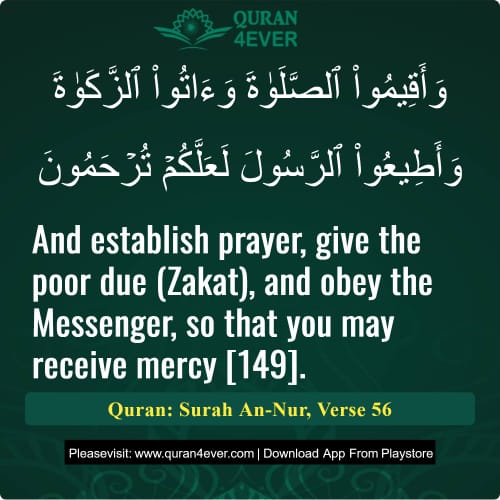
Transliteration:( Wa aqeemus Salaata wa aatuz Zakaata wa atee'ur Rasoola la'allakum turhamoon )
"And establish prayer, give the poor due (Zakat), and obey the Messenger, so that you may receive mercy [149]."
This verse outlines three foundational actions for earning Allah’s mercy:
Establishing Salah (prayer) – a direct connection with Allah and the ultimate act of devotion.
Giving Zakat – a financial purification that supports the poor and cultivates social justice.
Obeying the Messenger – which reflects complete submission to divine guidance.
Together, these three form the core pillars of an active and obedient Muslim life. The verse concludes with “so that you may receive mercy,” showing that Allah’s mercy is not random—it is drawn toward those who strive with sincerity.
56. And perform the Salah, and give the Zakah and obey the Messenger that you may receive mercy. 57. Consider not that the disbelievers can escape in the land. Their abode shall be the Fire — and worst indeed is that destination.
Allah commands His believing servants to establish prayer, which means worshipping Allah Alone with no partner or associate; to pay the Zakah, which is an act of kindness towards His poor and weak creatures; and by doing so to obey the Messenger of Allah , i.e., to do as he commands them and to avoid what he forbids them, so that Allah will have mercy on them for that. No doubt, whoever does that, Allah will have mercy on him, as Allah says in another Ayah:
(Allah will have His mercy on them) ﴿9:71﴾
(Consider not) means, `do not think, O Muhammad,’ that:
(the disbelievers) meaning, those who opposed and denied you,
(can escape in the land.) means, that they can flee from Allah. No, Allah is able to deal with them and He will punish them most severely for that. Allah says:
(Their abode) meaning, in the Hereafter,
(shall be the Fire — and worst indeed is that destination.) means, how terrible the consequences will be for the disbelievers, how evil a place to stay in and how awful a place to rest!
(24:56) Establish Prayer and pay Zakah and obey the Messenger so that mercy may be shown to you.
There is no commentary by Abul Maududi available for this verse.

For a faster and smoother experience,
install our mobile app now.
Related Ayat(Verses)/Topics